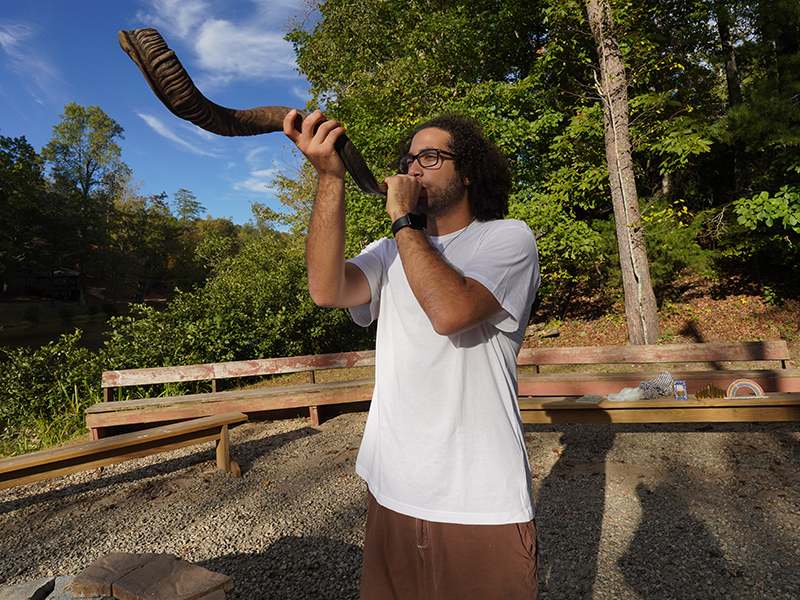This week with Yom Kippur we are continuing the theme of forgiveness. Rabbi Rick Jacobs revisits the story of Jonah and talks about how we must do what we can to create and support compassion.
Three ways to listen:
- Listen to the full podcast below
- Subscribe to the podcast on Apple Podcasts
- Suscribe to the RSS feed
Transcript
[URJ Intro] Welcome back to On The Other Hand: Ten Minutes of Torah. Podcast presented by reformjudaism.org. Each week Rabbi Rick Jacobs, the president of the Union for Reform Judaism, teaches us a little bit about where we are in the Jewish year. This week, Rabbi Jacobs teaches us about the book of Jonah. He asks about what the real work is of the high holy days, and Yom Kippur.
[Rabbi Rick Jacobs] This week, we focus our attention on the holiday of Yom Kippur, and depending on when you're listening to the podcast it could be the day before era of Yom Kippur, it could be maybe right before, it may be right after. But I want to focus not on all the majestic liturgy, and all of the many different observances. I want to just focus on the haftarah for Yom Kippur afternoon, which is the story of Jonah. It doesn't matter how elaborate your Jewish education is or isn't. The Jonah narrative is one that is just alive, and it is in some ways so unique.
Jonah is, in fact, one of the prophetic books in the Hebrew Bible, and it is a remarkable story. Can I just say that? You all know that if you've heard it as a child, or you've watched a child listen to the story of Jonah. It's an unbelievable story, literally unbelievable, and yet so incredibly profound. So the story, as you know, again chosen for the afternoon. Remember that time in the afternoon.
If you're a person who's fasting, it's that time when you're really unfocused, your stomach's growling, and you're trying to figure out, OK, how many more hours? Got a couple more hours here, and then all of a sudden this story of Jonah and the whale shows up. And what's amazing is that this story is very, very complex, and it's very educational. So in the Book of Job-- remember the Book of Job, the incredibly debilitating story of pain and loss?
In the Book of Job God is the problem, but in the book of Jonah the problem is Jonah. You see, God is merciful and forgiving, but our Jonah not so much. If you also think about the book, and I'll just do a little very simple retelling of the narrative, just so you've got the contours of it if it's maybe less familiar. You remember the story opens up, God says to Jonah I want you to go to Nineveh, and I want you to tell the Ninevites to turn in repentance, to heal their ways.
Now, that sounds like just a biblical commandment. Not such a big deal, but you've gotta remember who the Ninevites are. They are the archenemies, they are villains, they are people who are filled with hate and just malice against the Jewish people. So the prophet of the Jewish people is being sent to Nineveh to ask them to repent. Jonah wants no part of it.
Jonah says, you know, God says go there. He turns and goes the opposite way. Goes to Jaffa, and gets a ship, and is heading to Tarshis. You know the story. Then all of the sudden the wind starts to blow, and very, very stormy, and everybody's praying to God. And Jonah just goes down into the belly of the ship and is just kind of hiding, and then finally the captain finds Jonah and says wake up! Pray to your God! You know, stop this, and they draw lots to figure who's going to be thrown overboard.
Jonah says throw me overboard. I'm sure this is happening on account of me, so he's willing to commit suicide to be thrown overboard in this storm. And as he does, you know the story. He gets swallowed by this whale, and in the whale spends three days and three nights. You know, we think of that whale that's at the Museum of Natural History in New York. If you've been here, it's this huge, huge whale.
And he's in the belly, and finally God says can we take this again, Jonah? Are you ready now to go to the Ninevites? And so Jonah goes to Nineveh, and he does the most half-hearted call to repentance because he doesn't want to give them a chance. He's filled with real justified hatred to the Ninevites, so he goes one day's journey into this three day-wide city, and he walks into the middle he says repent, and just kind of says it.
But amazingly, the Ninevites hear even this little call to repentance, and they completely repent. They sit in sackcloth and ashes, they fast, they go through all of the required parts of chuva, of healing the repair, and they are not just walking the talk. They're doing it all the way, and God accepts it, and it makes Jonah so angry.
Well, if you think about it, Jonah is the problem. The Jew in this story is the one who is spiritually a dullard, right? The sailors, they're observant, they're obedient. The Ninevites, these seemingly hateful people, they're also quick to hear God's call, and to return. And the one who just is so spiritually stingy is our Jonah, and then the end of the book is that moment he's sitting pouting. He's furious at God and, you know, doesn't want to be a prophet, doesn't want to do this holy work.
And he's sitting there, and all of a sudden there's this covering, this gourd, that shelters him from the sun, and he wakes up God causes the gourd to shrivel. And Jonah feels terrible that the gourd is no longer, and God says really, Jonah? You didn't do anything to grow that gourd, that beautiful shelter. Also called in Hebrew sukkah, right?
So that helps us also to know that right after Yom Kippur there's Sukkot and those beautiful harvest holidays. God says you didn't do anything, and you're really that grieved over the loss of that little plant? And you didn't have any rachumas, any compassion, for what could have been over 100,000 people in Nineveh who didn't know their right hand from their left hand. What kind of spiritual leader are you? What kind of prophet are you? And the book ends.
Now, if the book were all about Jonah, I don't know that we would spend as much time on the holiest of days thinking about this story, but it really is about us, isn't it? Are we prophets? No, we're not prophets. Are we sent on holy missions? You bet. Are we supposed to give people the chance to earn that forgiveness? If you had the chance to listen to last week's podcast, we dove into this in a serious way.
I think it's really telling us first of all there are certain people on the planet that you don't want to forgive, that I don't want to forgive. They're just so antithetical to who we are. Can you think of anybody in that category? Can you think of a few people maybe in your family or your circle of friends who've done something so hurtful that there's just nothing they could ever do? Well, we all have those people.
Are those people potentially in public life? Oh, you bet. No matter where you are in the political spectrum, you've got those people. So the book of Jonah picks probably the most objectionable possible group of people that are given the chance to earn back their forgiveness of Jonah and God. God of course accepts their chuva, accepts their return, but Jonah just can't. So here it is.
You know, maybe before the holiday you'll think about the podcast during the reading of Jonah this year. It's such a powerful reminder that there's nobody on the planet who automatically should not even have the chance. And how do we not only read these stories, how do we live them out in our own families and in our own circles of community and relationship? And that's why I love this book and this guy Jonah.
It's really a drama about strict justice, and mercy, and compassion. We can be really strict and very judgmental for those who we live our lives with, or we can take a little lesson from God and have a whole lot more compassion than we have of that strict judgemental. So we think about this. There's an amazing little passage in the Jerusalem Talmud where Rabbi Shimon bar Yochai say the repentance of the Ninevites was fraudulent, so kind of coming to the defense of Jonah.
You know, that can't be real. That's fake. Well, you know what? I don't know that we're in the business of judging whose repentance is fake and whose is real. Our sacred work is to do that work ourselves and to give everyone, but I mean everyone around us, that same spiritual opportunity. And we might feel more sympathy for a gourd than for a whole people, but that's the work.
The work isn't just to say the prayers and to fast for a few hours. The work is to use this as a way to repair all that is ailing in our world, all that's ailing in ourselves. And the story of Jonah, you know, being swallowed by a whale, that's the easy part. That's actually more believable than 100,000 plus Ninevites would actually turn from their ways and be accepted back into right relationships, so let's do the miraculous.
Each one of us in our own small and big ways, let's be those Jonas, but be the Jonas who are awakened by the power of teshuvah, the power of repentance. And be those people who are inspired to do it ourselves, and to grant those around us the chance to do it. So if you're about to observe Yom Kippur, I wish that it be a healing and a spiritually edifying day. If you've just observed it, I hope that the impact of the day will be with you for not just a couple more days or a couple more weeks, but will shape a new year, a 5780.
A year of blessing, of wholeness, of goodness, of love, and of teshuva, return and repentance.
[URJ Outro] Thanks for joining us on this week's episode of On The Other Hand: 10 Minutes of Torah. Want more? You can download a new episode each Monday on Apple Podcasts, or Google Play, or Stitcher, or wherever you get your podcasts. And if you like what you hear, write us a review, or share the podcast with a friend. For daily ongoing conversations about Jewish holidays, pop culture, rituals, current events and more, visit reformjudaism.org, and follow us on Twitter, Facebook, Instagram, and Pinterest.
You can also follow Rabbi Jacobs on Twitter and @URJPresident. On The Other Hand: Ten Minutes of Torah is a project of the Union for Reform Judaism, a leading voice in the discussion of modern Jewish life. And until next week, l'hitraot!
Give to the URJ
The Union for Reform Judaism leads the largest and most diverse Jewish movement in North America.





